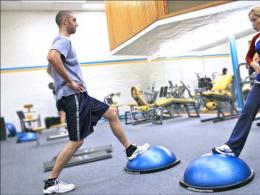Swimming in the pool during pregnancy. Can pregnant women go to the pool in the second and third trimester? What are the benefits and what are the contraindications
Expectant mothers during pregnancy try to carefully monitor their health, eat healthy foods and exercise - in general, they take a whole range of activities that have a beneficial effect on the health of the unborn child. If everything is clear with nutrition, then many pregnant women often have doubts about physical activity. Is it possible to play sports without harming the child and strengthening your health? Our answer is that it is possible, and even necessary! And nothing more than swimming in the pool will help you with this. Well, what are the benefits of exercising in the pool and are there any contraindications for pregnant women to this type of physical activity - we will consider in today's article.
The benefits of swimming in the pool for pregnant women
We all know perfectly well that when immersed in water, the body becomes light and weightless. Therefore, for pregnant women, especially in the last months of pregnancy, immersion in water helps to slightly unload the spine and muscles from the load, relieve back pain and reduce pressure on the joints. In addition, with the resistance of the body with water, there is a light and pleasant massage of the external and internal organs of the small pelvis, as well as the muscles of the whole body of a pregnant woman. Also, classes in the pool are recommended for those women who are faced with a problem. It is important to note that those mothers who regularly visited the pool during pregnancy do not have problems with lactation after childbirth, due to the blood flow to the chest and heart during swimming. And of course, due to the resistance to movement in the water, energy consumption increases, which helps to keep the optimal weight and not get better.
Diving brings great benefits to the body of a pregnant woman, because when you hold your breath, your baby activates all its reserves and gets used to the lack of oxygen. This is very useful during childbirth and labor, when oxygen is not supplied to the baby.
It's no secret that swimming in the pool is an excellent solution for hardening the body. Therefore, those future mothers who have chosen the pool are less likely to get sick and successfully strengthen their immunity.
With regard to psychological health, swimming in the pool also contributes to relaxation, relieving fatigue and stress. Staying in the water, a pregnant woman balances her psychological state, gets rid of fears, in a word - meditates. Psychologists recommend remembering those feelings of lightness and peace that visit you in the pool and remember this state during labor and childbirth.
In addition to all of the above, swimming in the pool is a great opportunity to communicate with the same expectant mothers, discuss your problems, and make friends.
Swimming in the pool: what you need to know?
Please note that the most optimal time for exercising in the pool is 30-45 minutes. In this case, the water temperature should be at least 27-29 degrees, so as not to provoke hypothermia of the body.
If during class you feel uncomfortable: you are cold, your blood pressure has increased, your heart rate has increased, or your head is spinning, then immediately stop exercising.
For pregnant women, there are special group classes in the pool, which are conducted by an experienced instructor, and there is also a nurse. Thus, you can not worry about your health, as the instructor will select the optimal load for you, and the nurse will monitor your health. Also, pay attention to how the water is purified in the pool you have chosen. Especially for pregnant women and babies, the pool water must be purified without the use of chlorine.
To exercise in the pool, you need to get a health certificate from a general practitioner and a gynecologist. Also for classes in the pool, get a comfortable swimsuit, rubber slippers, a hat. Going to the pool, take a light snack with you - after swimming you will want to eat.
Who is contraindicated in the pool?
Some pregnant women, alas, should not visit the pool, because in the presence of the following diseases, exercising in the water can aggravate the condition and harm both the expectant mother and the child. So, the pool is strictly contraindicated:
- when ;
- in case of habitual miscarriages;
- with uterine bleeding;
- with systematic pain after exercising in the water;
- with preeclampsia and eclampsia;
- with blood diseases;
- with chronic appendicitis;
- during an acute illness;
- with infectious and skin diseases;
- with fear of water.
Specially for Ira Romaniy
From Guest
In the House of Swimming MOTsVS, Moscow, Ibragimova st., 32, I was refused, referring to order No. 603 of 1987, pregnancy over 6 months is indicated in contraindications, but there is also a clarification that the list is indicative, requires the doctor to strictly individual approach. My gynecologist and therapist allowed the visit, but the pool doctor refused. Draw your own conclusions... apparently, something is wrong with this center.
Can pregnant women swim in the pool?
In anticipation of the baby, the lifestyle of the expectant mother changes dramatically. Those who were indifferent to physical activity pay attention to walks in the fresh air, and those who previously led a very active life and played sports, replace fitness activities with something more relaxed, such as brisk walking and stretching. An excellent choice would be swimming in the pool during pregnancy - doctors usually advise all women to do this type of physical education. Even if you used to visit the pool only during your school years, now is the time to resume classes. Can't swim? It does not matter, it is quite possible to simply perform a set of exercises in the water.
- Pool during pregnancy
- The benefits of swimming for expectant mothers
- Early visit
- Benefits in the later stages
- The effect of chlorinated water on the body of a baby and a pregnant woman
- How to swim
- Exercise for women in the second trimester
- Exercises for the 3rd trimester
- How to choose a swimsuit
- Contraindications
- What to bring
The question of the possibility of practicing water aerobic sports for expectant mothers is most often resolved positively, but there are a number of points that should be paid attention to.
The benefits and harms of the pool can be relative, because, firstly, a woman may have individual contraindications (for example, she has an allergic reaction to bleach, which is used to disinfect water in most sports complexes). Secondly, you need to know such nuances:
- it makes sense to refuse classes in the first 12 weeks;
- it is undesirable to visit the pool after 36 weeks;
- the presence of any disturbances in well-being should force you to temporarily cancel this physical activity.
Going to the pool is allowed only after obtaining consent from the gynecologist.
There are no exact data on the effect of chlorinated water on the fetus. However, it is known that this substance and its compounds can cause burns, can adversely affect cells. Basically, this remark concerns chlorine vapors. If such steam enters the body in large quantities, it is fraught with poisoning, the symptoms of which are:
- breathing problems;
- cough;
- headache;
- suffocation.
Naturally, the development of such a state is extremely rare, since a huge amount of this substance is not required for water treatment. And yet, a woman "in position" becomes extremely sensitive, and therefore it is not always possible to predict the body's reaction to chlorinated water.
To avoid unpleasant consequences with absolute certainty, you should choose modern sports complexes, where water is disinfected in other ways:
- laser;
- ultraviolet.
How to swim pregnant in the pool? The key is to avoid overload. Swim in the style you are used to and which is comfortable for you. The question of what style to swim is relevant for those who decided to learn the basics of swimming during pregnancy. If you do not know how to swim and do not yet find the strength and desire to master this art, take a circle or a swimming board and simply move in the water, working with your feet.
Some coaches advise to swim mainly in crawl during pregnancy, arguing that this is the safest form that does not overload muscles and joints.
- choose a pool with relatively warm water, more than +22 0;
- go into the water gradually;
- do not swim for more than 30 minutes in one visit;
- do not stay in a wet swimsuit: immediately after you have finished swimming, rinse in the shower and change.
Do not enter the water if you feel unwell. Better wait a couple of days, and then resume classes.
The benefits of swimming during pregnancy in the pool
So, we know what you need to think about before indulging in the power of the water element, what security measures to observe. Now let's talk about why it is worth visiting the pool.
Knowing how useful the swimming pool is for pregnant women, you will go to purchase a subscription with great pleasure.
Swimming in the pool is useful because:
- blood circulation increases, due to which metabolism improves;
- the work of venous valves improves (as a result, the risk of occurrence decreases);
- there is a training of the heart and blood vessels;
- the functioning of the respiratory system improves.
In addition, swimming perfectly unloads the spine. The increased weight shifts the center of gravity, the spine experiences enormous loads, and during the stay in the water, the weight is not felt. Joints and muscles are also unloaded - in general, a woman's well-being becomes better.
How much can you swim? The best option is two to three times a week. During breaks, the body rests, rebuilds. Daily intensive training is unlikely to benefit him now.

There is one more nuance regarding how the pool is useful for expectant mothers. It is considered by doctors as an anti-stress. The mother is immersed in the same water element in which her unborn child is now - this helps her feel unity with the baby, tune in to the “one wave” with him.
Swimming in early pregnancy
Despite the huge positive impact of swimming and water aerobics for pregnant ladies, the pool in the first trimester of pregnancy should be used with caution. The pros and cons here are:
- a woman tolerates toxicosis more easily;
- the body is tempered, prepared for a double load - this all speaks in favor of the pool.
Moments that should be alarming: in the first trimester, the mother's body does not yet perceive the fetus as part of itself, which means that there is an increased risk of miscarriage. Any active actions can provoke spontaneous abortion. Plus, this fact: the cork that will block the cervix, preventing bacteria from entering the uterus and keeping the fetus inside, is still being formed. This means that the unborn child is still defenseless. Perhaps it makes sense to swim in your own pool in the country for now and postpone trips to the public pool until a little later.
Swimming in late pregnancy
In the third trimester, pregnant women can go to the pool without fear, but only until the time when you feel the approach of childbirth. This means that, for example, at 7 months you can go to classes a couple of times a week, but after 36 weeks it is worth replacing classes with simple walking and visiting the water complex less often, limiting yourself to one lesson. This is due to the fact that the cork may already be slightly moving away, so it is easier for infections to penetrate the baby.
But in the pool with sea water you can swim freely. If the pool is warm, the water is heated - great. This negates the effect of stress arising from temperature differences.

Another small warning for those who are about to become a mother: convulsions often occur at a later date. They can also occur in water, especially if the water temperature is low. Then you need to immerse your head under water, grab yourself with your hand by the big toe of the injured leg and pull it towards you with force. It is advisable to quickly be out of the water: there you also need to pull your leg harder, despite the pain. The cramp will pass quickly.
Pregnancy and swimming pool with bleach
Can pregnant women in the pool with bleach in the first trimester? According to the prescriptions of doctors, it is better to wait until the second trimester.
In the second trimester, the harm of bleach for the baby will be so insignificant that it is hardly worth fearing any consequences: he is reliably protected inside his “house”. In the later stages, visit the pool with sea water or water purified by modern methods: in this case, the benefits will be much greater.
How to swim while pregnant in the pool
The general rule is: don't swim at your limits. It is unlikely that there is an exact answer to the question of how to swim in the pool during pregnancy. Each woman chooses a style that is convenient for her and those exercises that allow her to improve her well-being.

It will be correct to monitor your condition, the temperature of the water, go to the pool only after receiving permission from the doctor. You can swim both on your back and on your stomach: the water lightens the load. Is it possible to dive? If you know how to do it, then why not? But in this case, of course, it is better to choose pools with sea or mineral water, if there are any in your city.
Exercises in the pool for pregnant women (2nd trimester)
You can do pregnancy exercises in the pool if you are not going to swim. Take precautions: be sure to wear a hat and rubber slippers when you go to the water.
Immerse yourself in water up to about your chest.
Start twisting: holding on to the side, carefully turn the body in different directions.
Then do squats, standing at the side, turning around to face him and taking a stable position. The emphasis is on the walls of the pool.
Another exercise: lying on your stomach, holding on to the side, pull your knees to your chest as far as you can.
Exercises for pregnant women in the pool (third trimester)
Exercises in the pool during pregnancy in the third trimester should prepare the woman for the upcoming birth.
The main emphasis is placed on those exercises that help control breathing, since this skill is very important during the birth process. In addition, you should try to strengthen the muscles of the legs and abs as much as possible. Those who can swim can simply dive in and swim underwater for as long as possible.
For those who don't know how, you can try the following:
- cross your arms over your chest, hold your breath for a while and dive into the water (sit down); as soon as you feel that it has become difficult, emerge to the surface;
- placing a special hoop under the shoulder blades, lower your legs to the bottom; raise your legs to your chest, while trying to keep your legs in this position for 2 to 4 breaths; slowly lower your legs back;
- We stand up to the side and alternately raise and lower our legs.
By and large, any exercise will bring benefits, as long as they do not cause discomfort. Therefore, the main thing for a woman is to monitor her well-being and, at the slightest deterioration, leave the pool.
Maternity swimsuit for the pool
It is important to choose a swimsuit that is optimally suited for water aerobics and swimming in your particular position.
Swimwear for pregnant women for the pool must meet the following requirements:
- be sewn from a dense, at the same time "breathable" fabric, for example, microfiber;
- slightly tighten the tummy to make it easier for the expectant mother to “carry” it;
- do not press or squeeze anything.
The color can be any, just remember that a large drawing will visually enlarge you, and you have probably added a few kilograms anyway.
You can buy a tankini swimsuit with a high waist. Then it can be worn after childbirth, picking up other swimming trunks.
Contraindications to swimming during pregnancy
Your doctor may not give you permission to swim in the pool if you have:
- there is a risk of miscarriage;
- observed brown discharge from the vagina;
In such situations, swimming in the pool can be dangerous. Swimming lessons will do harm. The gynecologist will also be against sessions in cases where the expectant mother has a tendency to allergies or has not yet recovered from a cold.
What to bring to the pool
Before you go to water aerobics courses for expectant mothers, you will need to take a certificate from a doctor, indicating the absence of skin and some other diseases.
For swimming and gymnastics you will need:
- cap;
- rubber slippers;
- swimsuit;
- change of clothes;
- special circle (if you can't swim);
- hair dryer to dry your hair quickly.
Fitness during pregnancy is possible in strictly limited forms, for example, in the form of yoga or swimming.
Ask your doctor about how long you can exercise, which breathing and stretching exercises are best for you - and purchase a subscription. Let swimming lessons give you (and your baby) vigor and health!
Actual video
Can pregnant women go to the pool
Swimming benefits the body at any age. And during pregnancy, when physical activity is contraindicated for girls, they can still improve their health with the help of water procedures. During the third trimester, the expectant mother feels heaviness, feels clumsy on land. Plunging into the water, you can again feel the lightness, get rid of the unpleasant feeling of "burden". Water has the ability to relieve bodily tension, fatigue. In water and muscles stretch much easier. With its help, you can prepare for childbirth.
During childbirth, absolutely all muscles in the body of the expectant mother are tense. Classes in the pool will prepare the muscular system for the upcoming test. The girl will become more resilient and strong.
When immersed in water, it is convenient and beneficial to do exercises to relax and tense muscles. Thus, the body prepares for contractions. Over time, these manipulations will become automatic and the body will know exactly how to behave during childbirth. Various water exercises are recommended even for those girls who cannot swim.
What are the benefits of swimming during pregnancy?
Swimming has many benefits, but the most important ones are:
- and during pregnancy is a very serious and common problem. Swimming will help relieve tension and pain in the body, get rid of the disease itself.
- Uniform loads. Since, when immersed in water, the load is distributed evenly on all muscle groups (abdomen, pelvis and pelvic floor), during childbirth, the body will already be well prepared for the baby's exit.
Experts note that if a girl from the first trimester began to go to the pool, then during childbirth she will not have problems with tears, the process of childbirth will be easy and fast.
Swimming also strengthens the back muscles. During pregnancy, girls often feel pain in the lower back, since it is this part of the spine that takes on the main load. In water, this tension goes away, the load is removed, the back becomes relaxed.
Engaging in water procedures will also be useful for those girls who have been threatened with miscarriage due to overly tense abdominal muscles. In water, this overvoltage passes. Since it is impossible to lie on the stomach in an “interesting position”, immersion in water is a real salvation for expectant mothers. You can safely take the position with your stomach down and at the same time feel light and relaxed.
- Blood circulation in the body, cardiovascular and respiratory systems. Due to changes in water pressure, lymph and blood begin to circulate much faster, blood in the veins does not stagnate. During swimming, the lungs work well, breathe deeply and evenly.
Thanks to this, both the body of the expectant mother and the body of her baby receive the necessary dose of oxygen. In this case, the girl’s respiratory system also develops, which in the future will make it easier to endure the process of childbirth.
- Useful during pregnancy dive. Japanese statistics show that babies born to divers are born completely healthy and physically strong. This is dictated by the fact that during the dive, the expectant mother retains air for a long time. This breathing exercise is incredibly helpful.
Exercises can be done outside the pool, but when immersed, the process is much easier. Gymnastics in tandem with physical activity will bring many benefits.
- . The immune system improves due to all of the above factors. Since the temperature of the air is significantly different from the temperature of the water, exercise becomes a kind of hardening.
- Weight control. Classes in the pool make it possible to control weight changes during pregnancy and not gain extra pounds. Just one workout can burn over 600 kilocalories.
- Harmony with the unborn child. During classes, the expectant mother calms down, the body relaxes, the girl feels only positive emotions. The baby also feels all this on an equal level with her.
Swimming will help the baby to take the correct position in the womb, which becomes an important factor in the diagnosis of placenta previa. Doctors believe that the expectant mother should swim more so that the baby turns over and takes the correct position.
- Benefit for the baby. During childbirth, the baby will experience oxygen starvation, which will become a great stress for him. And breathing exercises during swimming train the lungs of not only the girl, but also her unborn baby.
- Psychological balance. Swimming classes will allow a woman to control her body and feel self-confidence. There are many like-minded people in the pool. If you make new acquaintances, training will not be tedious and boring: there is always something to discuss with friends.
When should classes start?
If there are no contraindications, it is better to start with trips to the pool from the first weeks of the “interesting situation”. Many gynecologists recommend that their patients start classes even during pregnancy planning. The sooner training begins, the faster the body will prepare for childbirth, it will be possible to prevent the appearance of problems with varicose veins, edema and the spine, and the state of health will improve.
Expectant mothers during pregnancy need to monitor their health. It takes more than one set of activities, including physical activity. The most convenient and safest sport is swimming in the pool. But ladies in position are afraid of excessive loads. Many people have a question about whether it is possible for pregnant women to go to the pool.
The benefits of swimming in the pool
Swimming in the pool has many benefits. The body acquires a certain lightness and weightlessness during immersion in water. Therefore, for all expectant mothers, especially those who are already in the last stages of pregnancy, the pool helps to relieve the muscles and spine from the load, reduces pressure on the blood vessels and helps to cope with lower back pain at least for a while. When the body is immersed in water, a pleasant and light massage of all internal organs and muscles of the body occurs.
And if expectant mothers suffer from edema, in this case, is it possible for pregnant women to go to the pool? Classes in the water are also recommended for those women who are faced with this problem. In addition, mothers who regularly visited the pool during pregnancy, due to the flow of blood to the heart and chest during swimming, do not have problems with lactation after childbirth. And most importantly, exercising in the pool contributes to energy consumption, which means it helps to keep the optimal weight, which is very important for a woman.
Simple diving brings great benefits to the body of the expectant mother. When the baby gets used to the lack of oxygen and activates all its reserves. During childbirth and contractions, the baby does not receive oxygen, so diving is good for the baby and is a kind of training for him.
Strengthening immunity
In addition, classes in the pool are an excellent hardening. get sick less often, which means that the risk to the health of the child is reduced. While visiting the pool, expectant mothers relax, relieve fatigue and stress, and take a break from everyday problems. Staying in the water balances the mental state of a pregnant woman, which is also important.
In addition, psychologists recommend remembering the feelings of peace and lightness that a woman experiences during classes and during childbirth. This has a positive effect on a woman in such a difficult period. A visit to the pool is a great opportunity to make new acquaintances and establish communication with other expectant mothers. And this is an excellent answer to the question of whether pregnant women can go to the pool.

What do you need to know to practice in the pool?
The optimal time for classes is from 20 minutes a day. The water temperature should be 27-29 degrees, cooler can provoke We have already answered the question of whether pregnant women can go to the pool. But if during his visit some discomfort is felt, the pulse quickens, the head is spinning, it is necessary to immediately stop classes.
Many women are provided with an instructor, and groups are also created for classes, during which a nurse must be nearby. The instructor will be able to choose the best exercise option for you, and the nurse will monitor your health throughout your stay in the water. Experts confidently say that pregnant women can swim in the pool.

Contraindications
You should also find out exactly how the pool is cleaned. Before classes with pregnant women, water purification should occur without chlorine.
But, despite the fact that visiting the pool gives so many advantages, for some expectant mothers, such activities are categorically contraindicated. These contraindications include severe toxicosis, the presence of habitual miscarriages, uterine bleeding, systemic pain after exercising in the water, preeclampsia and eclampsia, blood diseases, the presence of infectious and skin diseases, chronic appendicitis, and also, you need to consult a doctor and find out if you can whether pregnant women go to the pool. If there are no contraindications, then you can safely go.






